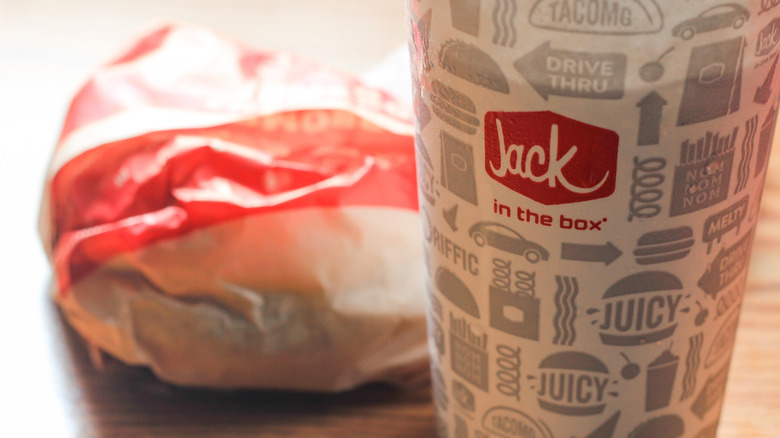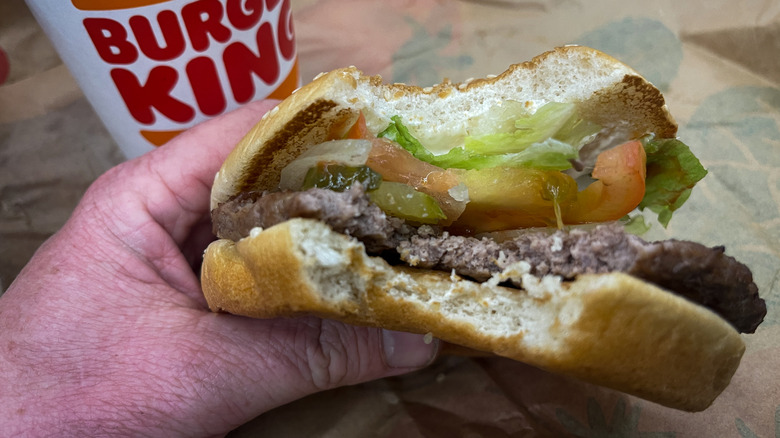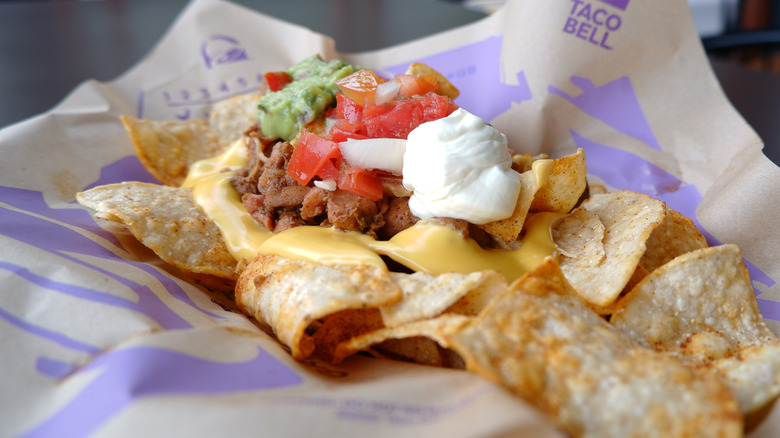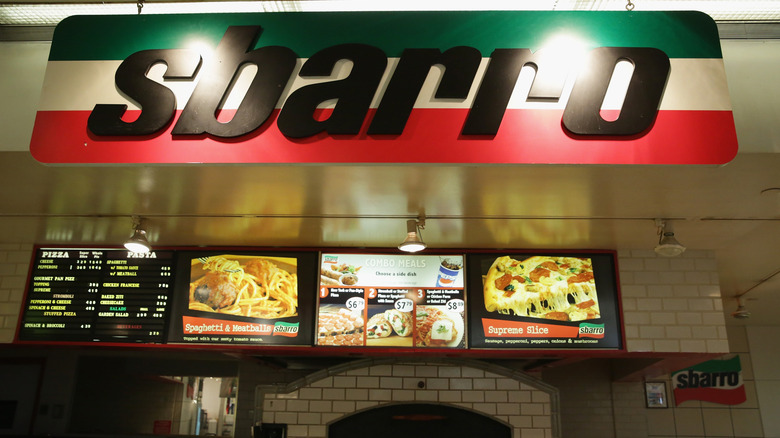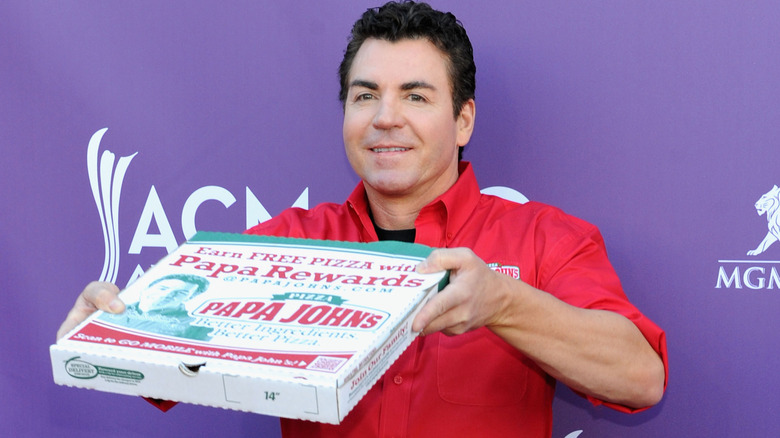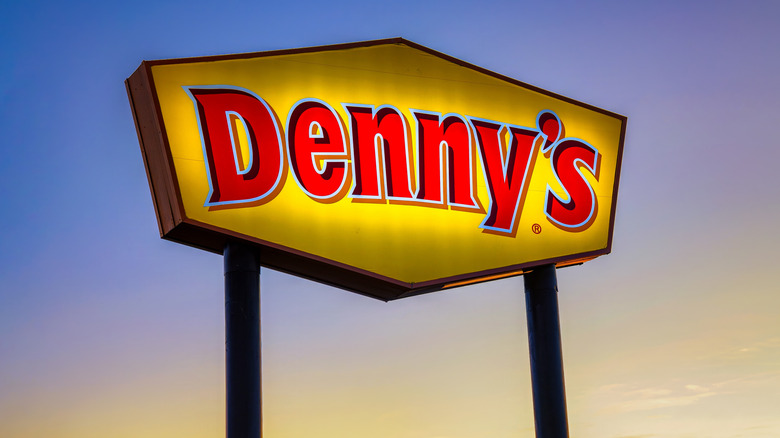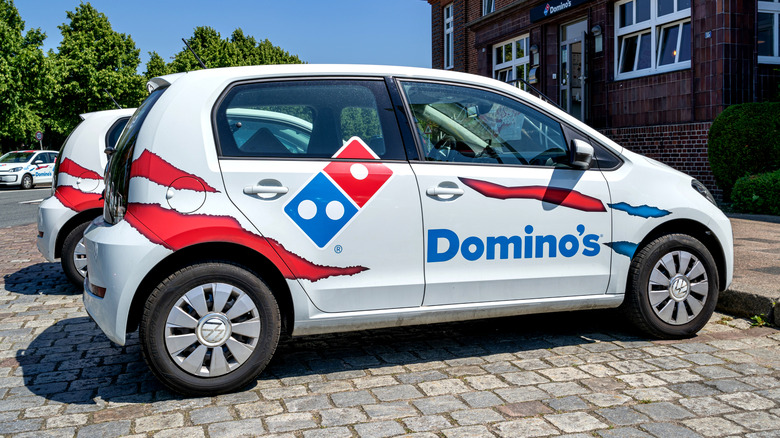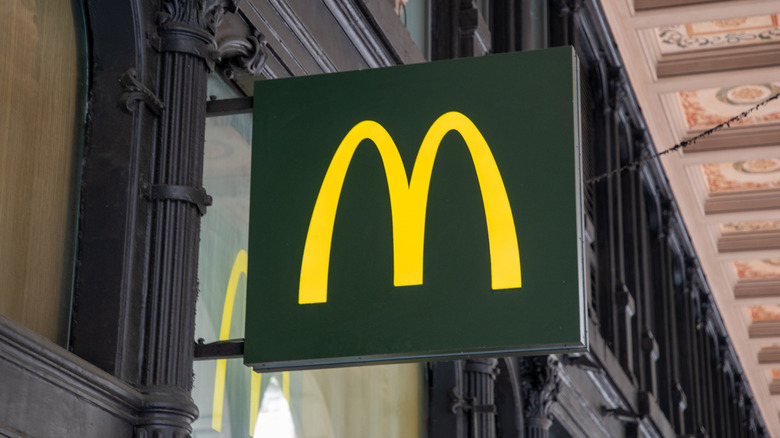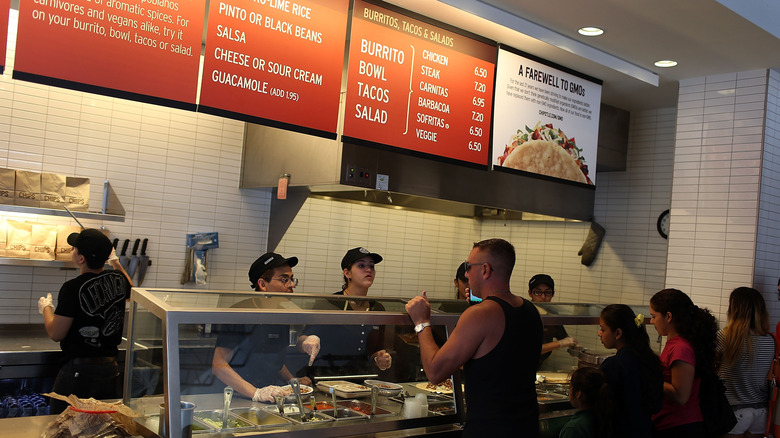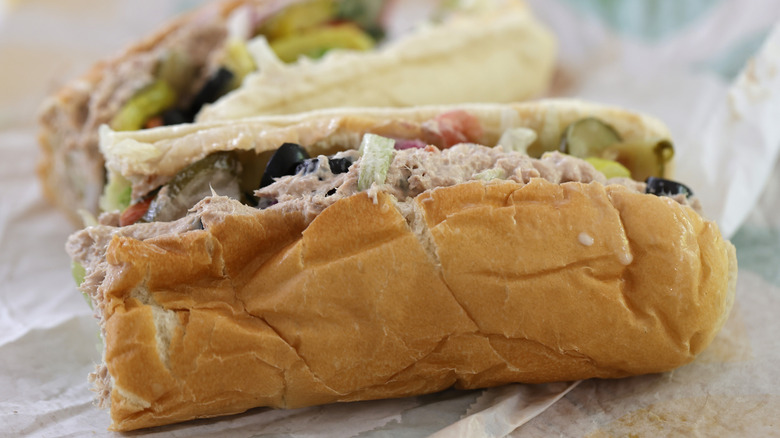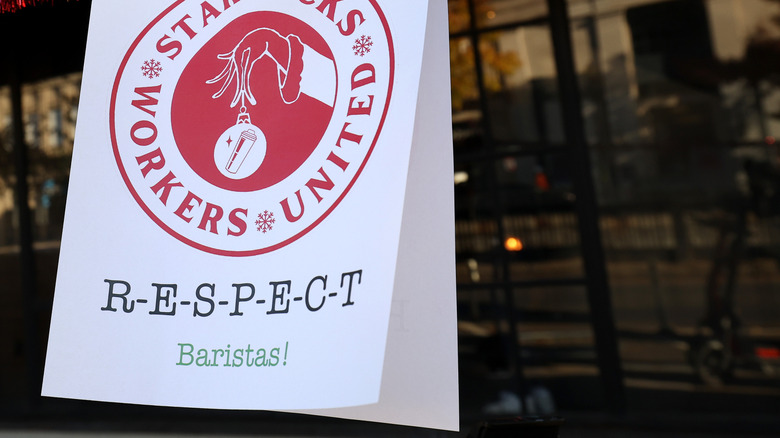Fast Food Restaurants That May Never Live Down Their Shady Pasts
Food is supposed to be wholesome and nourishing, not shrouded in scandal and laced with darkness. And that's especially the case for fast food, engineered to be as inoffensive and appealing to as many people as possible. But the biggest names in fast food got to where they are by not just selling stuff that tastes good — they did it with aggressive marketing techniques and adhering to a forward-moving corporate plan.
Food businesses of this nature require a lot of labor and a lot of infrastructure. And where there are that many moving parts often working independently of one another, it increases the chances that something can go wrong. And something almost inevitably will disintegrate. While no international fast food company has ever not made a serious mistake, some have committed fouls so awkward, ugly, or reprehensible that it loses the restaurants customers permanently, and it may forever diminish their standing with the public. Here are the fast food scandals that the world just might never forget, or forgive.
Jack in the Box and an e. coli breakout
It's more than 30 years in the past now, and the chain eventually recovered after enduring devastating hits to its reputation and bottom line, but for some people, Jack in the Box will always be the restaurant that served hamburgers so tainted with food-borne bacteria that it killed people. The Washington State's Department of Health observed a sudden rise in hemolytic uremic syndrome (HUS) among Seattle children in early 1993. Experiencing diarrhea, kidney failure, and blood clots, all the patients had recently eaten a Jack in the Box burger, and all had contracted the E. coli bacteria. It struck hard — over the next few weeks, more than 700 Jack in the Box diners across California, Idaho, and Nevada reported extreme illness. Four people — all children — died.
A federal investigation revealed that the meat became tainted at six Jack in the Back supplier slaughterhouses run by the Von Corporation, and that Jack in the Box had been previously told by public health agencies to cook its burgers to a safer, bacteria-killing internal temperature of 155 degrees Fahrenheit, not the 140 degrees Fahrenheit it said its customers preferred. After the outbreak, Jack in the Box's sales fell by 35%, necessitating layoffs and a temporary hold on opening new stores.
Burger King and horsemeat
In a 2012 safety test, Ireland's Food Safety Authority examined a series of frozen hamburger patties and ready-made meals obtained from supermarkets. Quite frequently, the tests returned results that showed the beef was not completely beef — 85% of the foods contested contained pork, while horse DNA was discovered in more than a third of the foods. The Food Safety Authority linked the sources of the horse-tainted beef to Ireland's Liffey Meats and two subsidiaries of one of Europe's most prolific beef distributors, ABP Food Group. That company then placed the blame on Polish and Spanish beef processors.
Countless Europeans undoubtedly became grossed-out and concerned about what exactly their supermarkets sold them, and in January 2013, the horse meat scandal moved into the fast food realm, ensnaring Burger King, one of the biggest burger brands on the planet. ABP-affiliated Silvercrest supplied Burger King with some of the beef for its European operations and assured the fast food royalty that it had not provided it with horse-tainted product. Nevertheless, Burger King tested some samples itself and found small amounts of horse DNA in meat found at a plant, but none in patties taken from restaurants. It's now impossible to buy horse meat in the U.S., even if you wanted to do so, but the slight possibility that some Europeans unwittingly ate that eschewed animal will certainly loom over the chain's European locations.
Taco Bell and its not-meat meat
What is commonly referred to as meat at Taco Bell isn't completely recognizable as the ground beef it purports to be. It's a sludgy, spiced, mostly solid slurry made up primarily of meat. Or maybe it wasn't always, as alleged by a lawsuit filed in January 2011. Alabama law firm Beasley Allen brought forth a class action case against the Mexican-inspired fast food chain, accusing Taco Bell of using so little meat in the meat used to fill tacos and burritos and to top nachos that the company shouldn't legally be allowed to call it beef. It hired a lab to run tests on Taco Bell meat and the results suggested that the stuff was just 35% meat. The rest: water, seasonings, oats, and other non-cow-based ingredients.
Apparently many Americans had also privately questioned the quality and makeup of Taco Bell's beef, because the lawsuit story went viral. Taco Bell responded by running ads in major American newspapers (per CNN), calling the allegations "absolutely false" and "egregious." In April 2011, Beasley Allen dropped the suit, having successfully forced Taco Bell's hand, it said. "Changes in marketing and product disclosure were made by the company," the firm said in a statement to CNN. And yet, Taco Bell said it didn't make any changes to its formulary or advertising plans.
Sbarro and organized crime
While American consumers had their pick of freestanding chain pizza parlors in the 1980s and 1990s, they often had just one option if they wanted a slice and were stuck in a mall: Sbarro. The chain was most associated with moderately thick-crust pizza sold by the slice, as well as Italian-inspired dishes like spaghetti and meatballs, sold at shopping centers, airports, and from other compact storefronts.
At the time of its bankruptcy filing and a planned financial restructuring in 2011, there were 1,045 Sbarro outlets around the world. It emerged from financial jeopardy with a plan to build new stores outside of dying shopping malls. But Sbarro's reputation for mediocre cuisine remained intact when the chain was revealed to have long-standing links to some of the most notorious organized crime families on the East Coast. According to the Philadelphia Inquirer, several pizza places in the Philadelphia area, including a Sbarro in the Echelon Mall, mysteriously burned down between 1978 and 1983, and authorities suspected arson ordered by the Gambino crime family.
In 2012, the New York Daily News exposed highlights of the FBI's file of mid-20th century mob operative Julius Bernstein. As part of his regular duties, he threatened and intimidated Sbarro brass into handing over large sums of cash as so-called "protection" fees. The shakedowns started in the 1960s and lasted until 2004, by which time Sbarro bosses had to pay out $20,000 a year.
Papa John's and its founder's ugly behavior
Papa John's was the official pizza sponsor of the NFL from 2010 until early 2018, when founder, chairman, and spokesperson John Schnatter began vocally and publicly opposing anti-racist and pro-social justice actions by players. Schnatter complained that the protests hurt the NFL so badly that it affected Papa John's sales. In a May 2018 conference call with Papa John's executives, Schnatter dismissed his comments as minor, and that they weren't as bad as the racial slurs Kentucky Fried Chicken founder Harlan Sanders supposedly once used. But Schnatter freely used a racial slur in the call, then brought up childhood memories of witnessing white Indianans kidnap and murder Black people.
When Schnatter's comments went public, he resigned as Papa John's chairman. "Papa John's condemns racism and any insensitive language, no matter the situation or setting," the company said in a statement (via The Independent). In the three months after Schnatter's charged remarks and subsequent split, Papa John's sales fell by 16%, with the chain losing out on an estimated $67.7 million in customer dollars. Three years later, in an attempt to move past the controversy once and for all and to subtly downplay its founder's role, Papa John's changed its name to Papa Johns. "Instead of being obsessed with Papa John and irrelevant changes to the brand logo, the company should become obsessed once again with making quality Papa John's pizza consistently," Schnatter said in a statement (via WeAreGreenBay).
Denny's and racism
Denny's may present like an old-fashioned diner, but the chain of 1,500-plus restaurants serves up fast food fare like burgers, fries, breakfasts, and sandwiches quickly and for prices that rival stores with drive-through windows. Most locations never close, ostensibly making Denny's an equalizing presence, open to everyone at any time. But in practice, that hasn't always been true, as the chain has been the subject of racially inflammatory incidents over the years.
After six Black members of the Secret Service weren't permitted to eat at an Annapolis, Maryland, Denny's, in 1993, they filed a discrimination suit. While that could be written off as an isolated incident, just a year later, the chain paid out $54 million in legal settlements to Black customers who had been the victims of racial discrimination or mistreatment at several of its restaurants. And similar things just kept going at various Denny's outlets around the country. Two Black customers seeking to eat at a California Denny's in 2012 were asked to pre-pay for their meals (not company policy), with a manager citing previous Black customers not paying as the reason. And in 2023, two Black men were refused service at a Denny's in South Dakota; a server called police, and a video of the incident went viral. Denny's claimed to start an internal investigation, but offered no apology.
Domino's and its delivery devastation
Since its beginnings as a tiny parlor in Ypsilanti, Michigan, in the early 1960s, Domino's has been a delivery-first operation. By the 1980s, there were thousands of the no-frills pizza outposts around the world, leading to major growth bolstered by an ad campaign and customer promise that debuted in 1979. Domino's boldly guaranteed that it would deliver hot pizza to a customer's home in no more than 30 minutes after they placed the order. If it didn't get there in time, said Domino's customer got a free pizza. It was such an audacious idea, to prepare, bake, and drive a pizza in an almost physically impossible timeframe, that it built up Domino's customer base to include people hoping to land themselves a pie free of charge.
Near the end of the 1980s, Domino's tweaked the promotion, offering a $3 coupon for pizzas that didn't arrive on time before sunsetting the concept entirely by 1993. And that's because Domino's delivery drivers had become a menace to public safety and a potential trigger for costly lawsuits. The AFL-CIO labor union reported that speedy Domino's workers had been a party to more than 300 car accidents during the 30-minutes-or-less years. In 1993, Domino's also lost a $79 million lawsuit filed by a woman injured when struck by one of the company's pizza delivery drivers.
McDonald's and the French resistance
McDonald's has an immense impact on the U.S. economy, and the world's, too. It brought burgers and McNuggets to most corners of the world, all while earning millions and acting as a symbol of the American way. In a McDonald's-adjacent development in 1999, the European Union disallowed the use of American beef because hormone use exceeded the organization's safety standard. In response, the U.S. installed hefty tariffs on European items, such as French Roquefort cheese. In an act of anti-American sentiment, five unionized farmers pulled down and destroyed a semi-constructed new McDonald's restaurant in Millau, France, in 1999.
The farmers, who also held a Roquefort tasting party during the melée, caused €120,000 worth of property damage. All five men were found guilty, but only the leader, José Bové, went to prison, for a three month period. Bové became something of a French folk hero, winning a parliament seat and becoming a leader of an anti-globalization political movement, while McDonald's was perceived as an encroaching villain.
McDonald's endured the French animosity and eventually grew a network of 1,500-plus restaurants. The distrusted company's expansion across France seemed suspect to L'Express reporter Emmanuel Paquette, who discovered that McDonald's didn't pay taxes on its French earnings by way of a Luxembourg-based shell corporation. Authorities held McDonald's liable for taxes unpaid between 2009 and 2020. The case was settled in 2022, but a tarnished McDonald's has an uphill battle to fight regarding its public perception in Europe.
Chipotle and multiple norovirus outbreaks
Chipotle is getting more expensive again, and America isn't so hyped for the burrito chain these days anyway. There could be some lingering distrust from a tainted food scandal. Norovirus is a particularly communicable and volatile disease that leads to severe gastrointestinal problems that can last for many days, including vomiting, nausea, stomach pain, and diarrhea. Between 2015 and 2018, an estimated 1,100 people throughout Virginia, Ohio, Boston, and Los Angeles contracted the norovirus after eating at various Chipotle branches.
The Boston situation was particularly horrendous, with 141 documented patients who very likely fell ill after a meal at the Mexican-inspired eatery. Chipotle later admitted in court proceedings that if its restaurants did spread norovirus, it was because its employees didn't follow proper food handling protocols and that they felt like they had to go into work even if they were quite sick (like with the norovirus).
The U.S. Justice Department levied criminal charges against Chipotle, alleging two violations of the Federal Food, Drug, and Cosmetic Act. Prosecutors argued that the chain had engaged in "adulterating food while held for sale after shipment in interstate commerce," according to the New York Times. In 2020, Chipotle agreed to pay a $25 million fine to drop the case.
Subway and its questionable bread, tuna, chicken, and spokesperson
Positioning itself as a "healthy" fast food joint worked out very well for Subway. America has an unfathomable amount of Subway locations — nearly eight times the number of its closest competitor, Jimmy John's. In 2000, Subway hired as its spokesperson Jared Fogle, who'd lost 245 pounds by walking and eating a diet of mostly Subway sandwiches. Fogle served in that role for years, until 2015, following his trial, conviction, and sentencing for a series of crimes against minors.
Almost concurrently with Fogle's downfall, Subway began to face scrutiny over the purported healthful value of its food. A food blogger reported in 2014 that the chain's bread contained azodicarbonamide, a dough conditioner that creates a small amount of carcinogen during baking; Subway subsequently claimed that it had already begun getting rid of azodicarbonamide in its bread. Similarly, a 2021 lawsuit alleged the chain's tuna didn't really contain tuna. A New York Times reporter ordered testing on the product, and it indeed included no tuna DNA.
Though the suit was dropped, trade magazine Restaurant Business reported in 2023 that Subway faces the worst online reputation of fast food chains. Subway has been seeking to reframe its position since 2021, when it launched the "Eat Fresh Refresh." According to a press release, the chain dedicated itself to "making improvements to almost every core menu item" including "11 new and improved ingredients." It may not be working — Subway closed about 400 stores in 2023.
Starbucks and its opposition to unionized labor
In 2009, Congressional democrats sought to pass a labor reform bill called the Employee Free Choice Act, which would make it easier for workers in many industries to form labor unions. With collective bargaining often leading to owners having to weigh profit-trimming workforce demands against the threat of strike, pro-business organizations lobbied to stop the law from going into effect.
CEO Howard Schultz joined Starbucks in 1981, and under his direction the chain became a global phenomenon and leader in premium coffee drinks. He also led the anti-Employee Free Choice contingent, proposing a counter plan that penalized union-busting but would also continue to make it difficult for Starbucks employees to unionize.
The bill never did pass, but Schultz's anti-labor actions came back into view in 2019 when he launched an ultimately unsuccessful presidential campaign. Meanwhile, Starbucks employees continued to agitate for unionization. With some particularly motivated by pandemic-era cutbacks and hardships — many baristas found their wages cut and supply chains interrupted — the first 17 locations voted to join a union in 2021 and 2022. In October 2023, Starbucks continued its public fight against unions via a lawsuit of its employees' labor organizer, Workers United, because it posted a message in support of Palestine on social media during the early days of the Gaza-based conflict with Israel. That led to one boycott of Starbucks by Palestine supporters to go along with one called for to support the baristas trying to unionize.

